Professional Employability Portfolio: Recruitment Skills Analysis
VerifiedAdded on 2023/06/05
|14
|2447
|193
Portfolio
AI Summary
This employability portfolio assesses a graduate's readiness for a professional recruiter role, highlighting essential skills, knowledge, and areas for development. It includes a job summary, an evaluation of the graduate's proficiency, and a critique of the DOTS model's significance in career development. The portfolio identifies the graduate's strengths in communication, computer literacy, and academic understanding of human resource management, while also acknowledging limitations in practical experience and organizational planning. A personal development plan is outlined to address these weaknesses through mentorship, training courses, and networking. The portfolio concludes that targeted development will enhance the graduate's employability and effectiveness as a recruiter. Desklib provides this and other solved assignments.
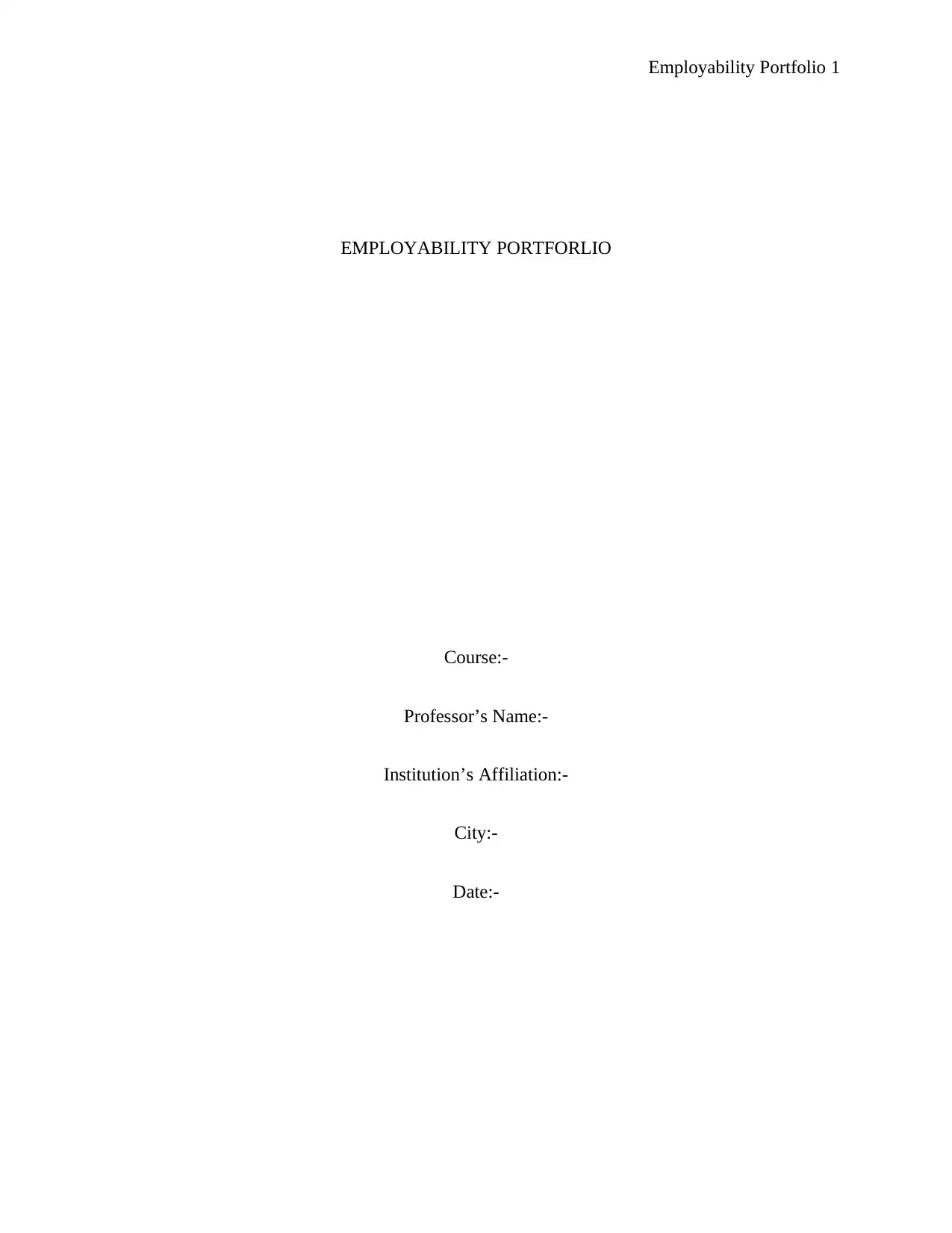
Employability Portfolio 1
EMPLOYABILITY PORTFORLIO
Course:-
Professor’s Name:-
Institution’s Affiliation:-
City:-
Date:-
EMPLOYABILITY PORTFORLIO
Course:-
Professor’s Name:-
Institution’s Affiliation:-
City:-
Date:-
Paraphrase This Document
Need a fresh take? Get an instant paraphrase of this document with our AI Paraphraser
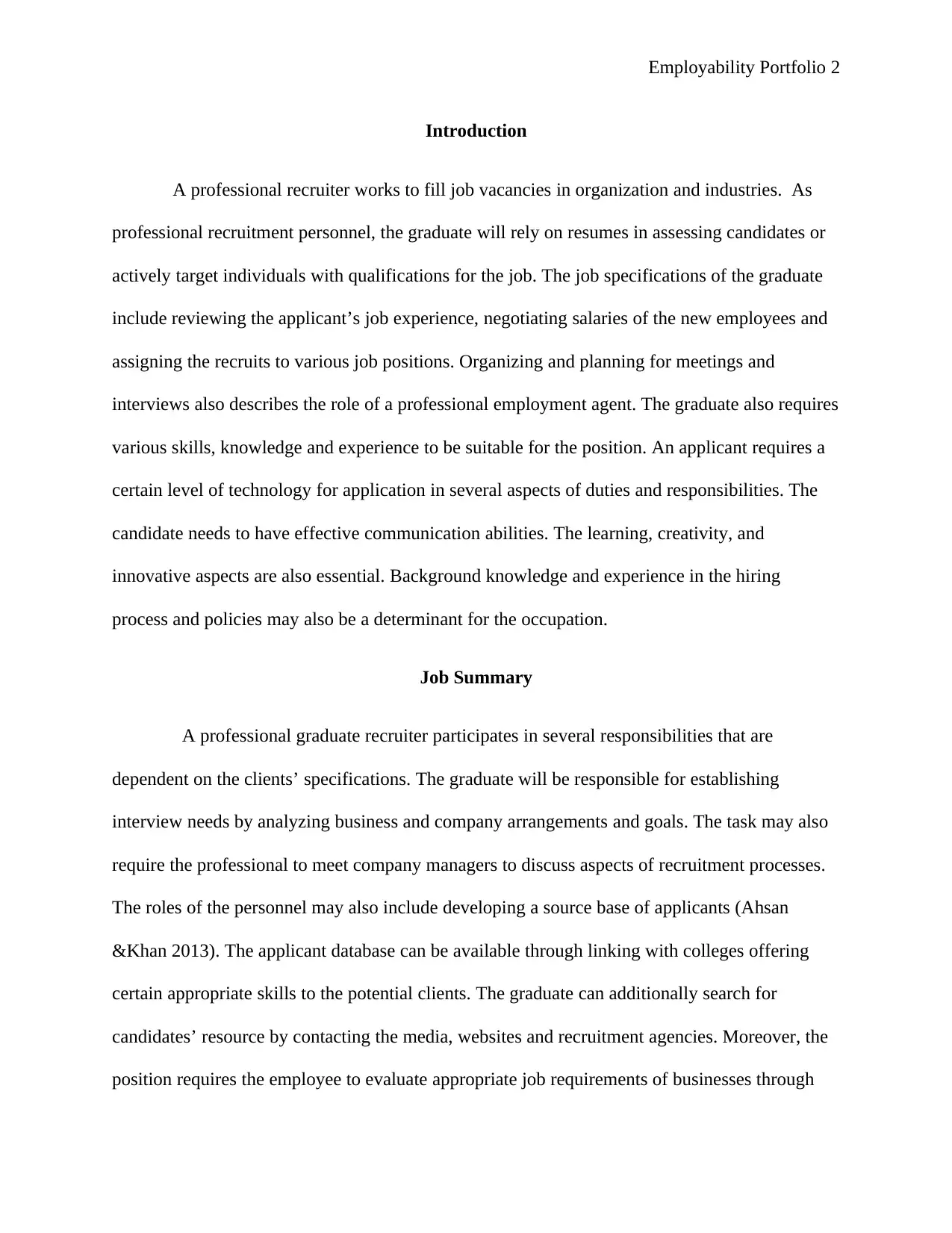
Employability Portfolio 2
Introduction
A professional recruiter works to fill job vacancies in organization and industries. As
professional recruitment personnel, the graduate will rely on resumes in assessing candidates or
actively target individuals with qualifications for the job. The job specifications of the graduate
include reviewing the applicant’s job experience, negotiating salaries of the new employees and
assigning the recruits to various job positions. Organizing and planning for meetings and
interviews also describes the role of a professional employment agent. The graduate also requires
various skills, knowledge and experience to be suitable for the position. An applicant requires a
certain level of technology for application in several aspects of duties and responsibilities. The
candidate needs to have effective communication abilities. The learning, creativity, and
innovative aspects are also essential. Background knowledge and experience in the hiring
process and policies may also be a determinant for the occupation.
Job Summary
A professional graduate recruiter participates in several responsibilities that are
dependent on the clients’ specifications. The graduate will be responsible for establishing
interview needs by analyzing business and company arrangements and goals. The task may also
require the professional to meet company managers to discuss aspects of recruitment processes.
The roles of the personnel may also include developing a source base of applicants (Ahsan
&Khan 2013). The applicant database can be available through linking with colleges offering
certain appropriate skills to the potential clients. The graduate can additionally search for
candidates’ resource by contacting the media, websites and recruitment agencies. Moreover, the
position requires the employee to evaluate appropriate job requirements of businesses through
Introduction
A professional recruiter works to fill job vacancies in organization and industries. As
professional recruitment personnel, the graduate will rely on resumes in assessing candidates or
actively target individuals with qualifications for the job. The job specifications of the graduate
include reviewing the applicant’s job experience, negotiating salaries of the new employees and
assigning the recruits to various job positions. Organizing and planning for meetings and
interviews also describes the role of a professional employment agent. The graduate also requires
various skills, knowledge and experience to be suitable for the position. An applicant requires a
certain level of technology for application in several aspects of duties and responsibilities. The
candidate needs to have effective communication abilities. The learning, creativity, and
innovative aspects are also essential. Background knowledge and experience in the hiring
process and policies may also be a determinant for the occupation.
Job Summary
A professional graduate recruiter participates in several responsibilities that are
dependent on the clients’ specifications. The graduate will be responsible for establishing
interview needs by analyzing business and company arrangements and goals. The task may also
require the professional to meet company managers to discuss aspects of recruitment processes.
The roles of the personnel may also include developing a source base of applicants (Ahsan
&Khan 2013). The applicant database can be available through linking with colleges offering
certain appropriate skills to the potential clients. The graduate can additionally search for
candidates’ resource by contacting the media, websites and recruitment agencies. Moreover, the
position requires the employee to evaluate appropriate job requirements of businesses through
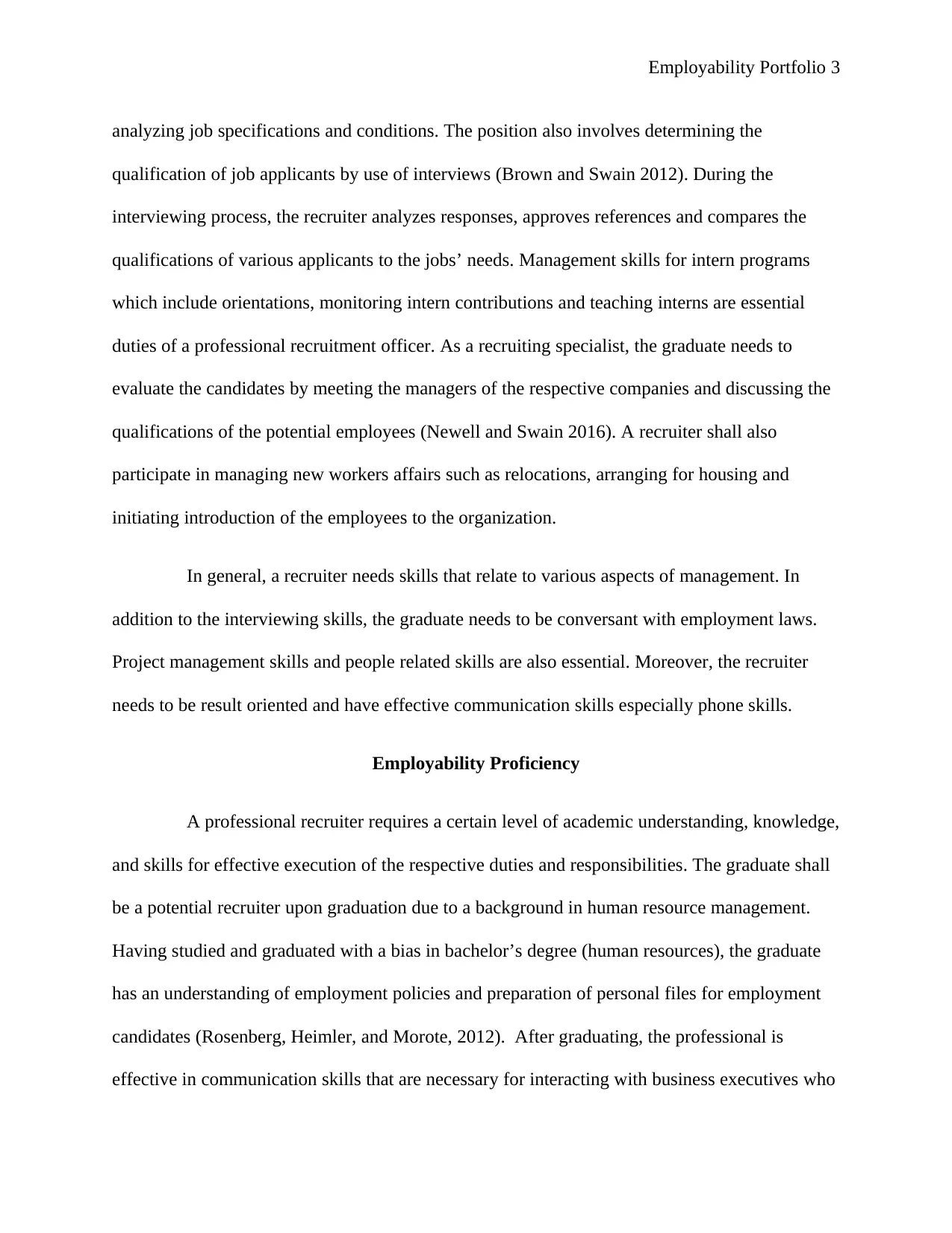
Employability Portfolio 3
analyzing job specifications and conditions. The position also involves determining the
qualification of job applicants by use of interviews (Brown and Swain 2012). During the
interviewing process, the recruiter analyzes responses, approves references and compares the
qualifications of various applicants to the jobs’ needs. Management skills for intern programs
which include orientations, monitoring intern contributions and teaching interns are essential
duties of a professional recruitment officer. As a recruiting specialist, the graduate needs to
evaluate the candidates by meeting the managers of the respective companies and discussing the
qualifications of the potential employees (Newell and Swain 2016). A recruiter shall also
participate in managing new workers affairs such as relocations, arranging for housing and
initiating introduction of the employees to the organization.
In general, a recruiter needs skills that relate to various aspects of management. In
addition to the interviewing skills, the graduate needs to be conversant with employment laws.
Project management skills and people related skills are also essential. Moreover, the recruiter
needs to be result oriented and have effective communication skills especially phone skills.
Employability Proficiency
A professional recruiter requires a certain level of academic understanding, knowledge,
and skills for effective execution of the respective duties and responsibilities. The graduate shall
be a potential recruiter upon graduation due to a background in human resource management.
Having studied and graduated with a bias in bachelor’s degree (human resources), the graduate
has an understanding of employment policies and preparation of personal files for employment
candidates (Rosenberg, Heimler, and Morote, 2012). After graduating, the professional is
effective in communication skills that are necessary for interacting with business executives who
analyzing job specifications and conditions. The position also involves determining the
qualification of job applicants by use of interviews (Brown and Swain 2012). During the
interviewing process, the recruiter analyzes responses, approves references and compares the
qualifications of various applicants to the jobs’ needs. Management skills for intern programs
which include orientations, monitoring intern contributions and teaching interns are essential
duties of a professional recruitment officer. As a recruiting specialist, the graduate needs to
evaluate the candidates by meeting the managers of the respective companies and discussing the
qualifications of the potential employees (Newell and Swain 2016). A recruiter shall also
participate in managing new workers affairs such as relocations, arranging for housing and
initiating introduction of the employees to the organization.
In general, a recruiter needs skills that relate to various aspects of management. In
addition to the interviewing skills, the graduate needs to be conversant with employment laws.
Project management skills and people related skills are also essential. Moreover, the recruiter
needs to be result oriented and have effective communication skills especially phone skills.
Employability Proficiency
A professional recruiter requires a certain level of academic understanding, knowledge,
and skills for effective execution of the respective duties and responsibilities. The graduate shall
be a potential recruiter upon graduation due to a background in human resource management.
Having studied and graduated with a bias in bachelor’s degree (human resources), the graduate
has an understanding of employment policies and preparation of personal files for employment
candidates (Rosenberg, Heimler, and Morote, 2012). After graduating, the professional is
effective in communication skills that are necessary for interacting with business executives who
⊘ This is a preview!⊘
Do you want full access?
Subscribe today to unlock all pages.

Trusted by 1+ million students worldwide
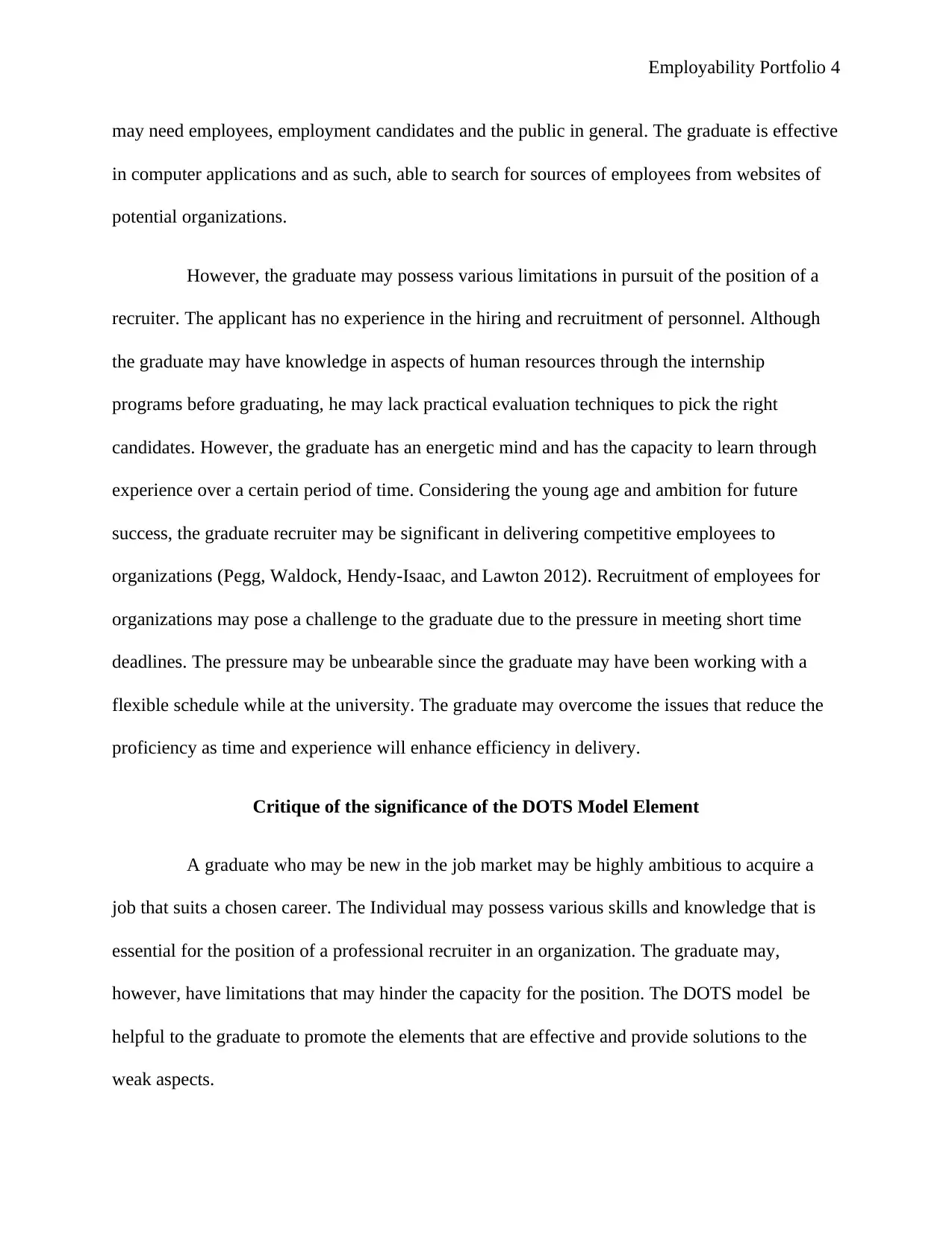
Employability Portfolio 4
may need employees, employment candidates and the public in general. The graduate is effective
in computer applications and as such, able to search for sources of employees from websites of
potential organizations.
However, the graduate may possess various limitations in pursuit of the position of a
recruiter. The applicant has no experience in the hiring and recruitment of personnel. Although
the graduate may have knowledge in aspects of human resources through the internship
programs before graduating, he may lack practical evaluation techniques to pick the right
candidates. However, the graduate has an energetic mind and has the capacity to learn through
experience over a certain period of time. Considering the young age and ambition for future
success, the graduate recruiter may be significant in delivering competitive employees to
organizations (Pegg, Waldock, Hendy-Isaac, and Lawton 2012). Recruitment of employees for
organizations may pose a challenge to the graduate due to the pressure in meeting short time
deadlines. The pressure may be unbearable since the graduate may have been working with a
flexible schedule while at the university. The graduate may overcome the issues that reduce the
proficiency as time and experience will enhance efficiency in delivery.
Critique of the significance of the DOTS Model Element
A graduate who may be new in the job market may be highly ambitious to acquire a
job that suits a chosen career. The Individual may possess various skills and knowledge that is
essential for the position of a professional recruiter in an organization. The graduate may,
however, have limitations that may hinder the capacity for the position. The DOTS model be
helpful to the graduate to promote the elements that are effective and provide solutions to the
weak aspects.
may need employees, employment candidates and the public in general. The graduate is effective
in computer applications and as such, able to search for sources of employees from websites of
potential organizations.
However, the graduate may possess various limitations in pursuit of the position of a
recruiter. The applicant has no experience in the hiring and recruitment of personnel. Although
the graduate may have knowledge in aspects of human resources through the internship
programs before graduating, he may lack practical evaluation techniques to pick the right
candidates. However, the graduate has an energetic mind and has the capacity to learn through
experience over a certain period of time. Considering the young age and ambition for future
success, the graduate recruiter may be significant in delivering competitive employees to
organizations (Pegg, Waldock, Hendy-Isaac, and Lawton 2012). Recruitment of employees for
organizations may pose a challenge to the graduate due to the pressure in meeting short time
deadlines. The pressure may be unbearable since the graduate may have been working with a
flexible schedule while at the university. The graduate may overcome the issues that reduce the
proficiency as time and experience will enhance efficiency in delivery.
Critique of the significance of the DOTS Model Element
A graduate who may be new in the job market may be highly ambitious to acquire a
job that suits a chosen career. The Individual may possess various skills and knowledge that is
essential for the position of a professional recruiter in an organization. The graduate may,
however, have limitations that may hinder the capacity for the position. The DOTS model be
helpful to the graduate to promote the elements that are effective and provide solutions to the
weak aspects.
Paraphrase This Document
Need a fresh take? Get an instant paraphrase of this document with our AI Paraphraser
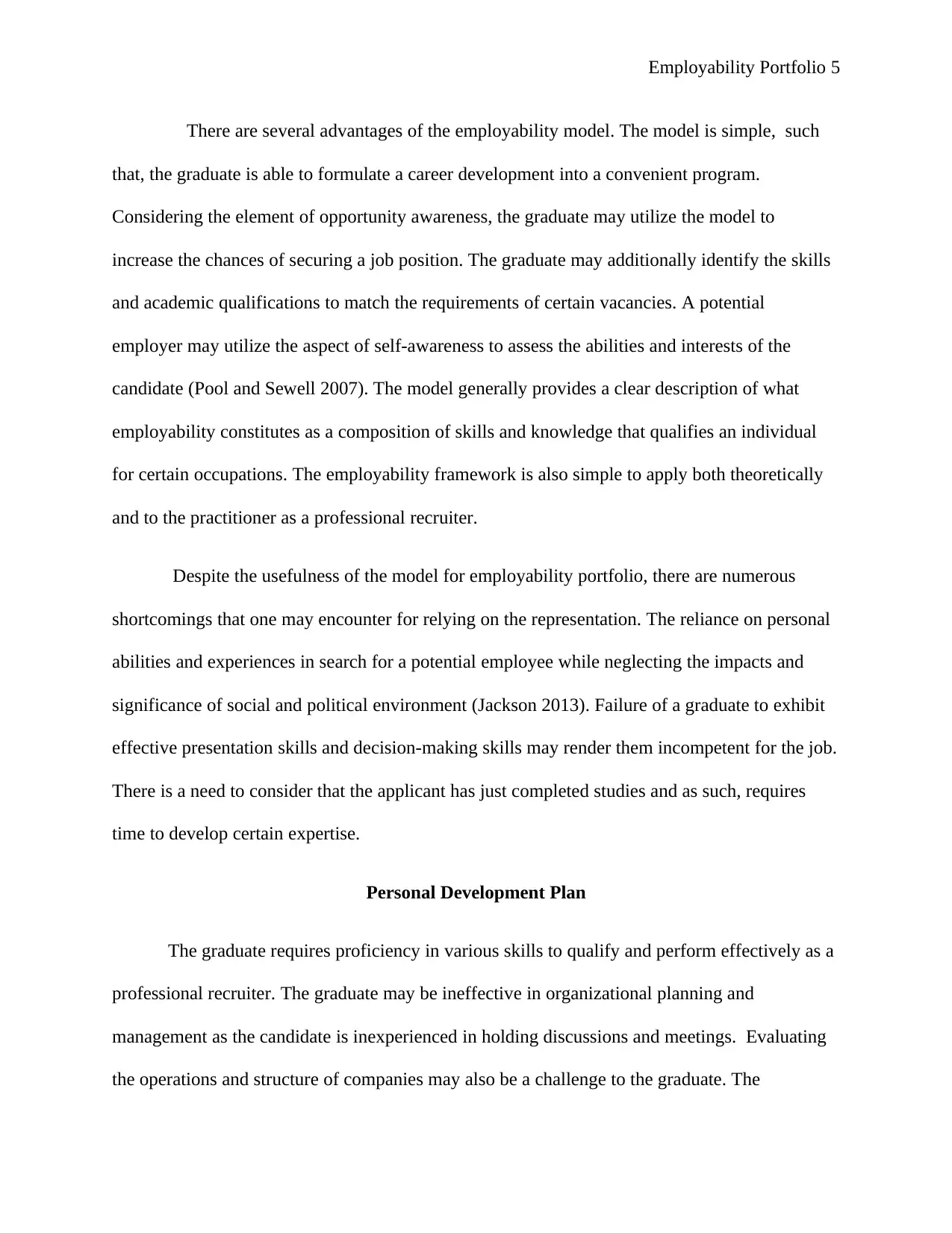
Employability Portfolio 5
There are several advantages of the employability model. The model is simple, such
that, the graduate is able to formulate a career development into a convenient program.
Considering the element of opportunity awareness, the graduate may utilize the model to
increase the chances of securing a job position. The graduate may additionally identify the skills
and academic qualifications to match the requirements of certain vacancies. A potential
employer may utilize the aspect of self-awareness to assess the abilities and interests of the
candidate (Pool and Sewell 2007). The model generally provides a clear description of what
employability constitutes as a composition of skills and knowledge that qualifies an individual
for certain occupations. The employability framework is also simple to apply both theoretically
and to the practitioner as a professional recruiter.
Despite the usefulness of the model for employability portfolio, there are numerous
shortcomings that one may encounter for relying on the representation. The reliance on personal
abilities and experiences in search for a potential employee while neglecting the impacts and
significance of social and political environment (Jackson 2013). Failure of a graduate to exhibit
effective presentation skills and decision-making skills may render them incompetent for the job.
There is a need to consider that the applicant has just completed studies and as such, requires
time to develop certain expertise.
Personal Development Plan
The graduate requires proficiency in various skills to qualify and perform effectively as a
professional recruiter. The graduate may be ineffective in organizational planning and
management as the candidate is inexperienced in holding discussions and meetings. Evaluating
the operations and structure of companies may also be a challenge to the graduate. The
There are several advantages of the employability model. The model is simple, such
that, the graduate is able to formulate a career development into a convenient program.
Considering the element of opportunity awareness, the graduate may utilize the model to
increase the chances of securing a job position. The graduate may additionally identify the skills
and academic qualifications to match the requirements of certain vacancies. A potential
employer may utilize the aspect of self-awareness to assess the abilities and interests of the
candidate (Pool and Sewell 2007). The model generally provides a clear description of what
employability constitutes as a composition of skills and knowledge that qualifies an individual
for certain occupations. The employability framework is also simple to apply both theoretically
and to the practitioner as a professional recruiter.
Despite the usefulness of the model for employability portfolio, there are numerous
shortcomings that one may encounter for relying on the representation. The reliance on personal
abilities and experiences in search for a potential employee while neglecting the impacts and
significance of social and political environment (Jackson 2013). Failure of a graduate to exhibit
effective presentation skills and decision-making skills may render them incompetent for the job.
There is a need to consider that the applicant has just completed studies and as such, requires
time to develop certain expertise.
Personal Development Plan
The graduate requires proficiency in various skills to qualify and perform effectively as a
professional recruiter. The graduate may be ineffective in organizational planning and
management as the candidate is inexperienced in holding discussions and meetings. Evaluating
the operations and structure of companies may also be a challenge to the graduate. The
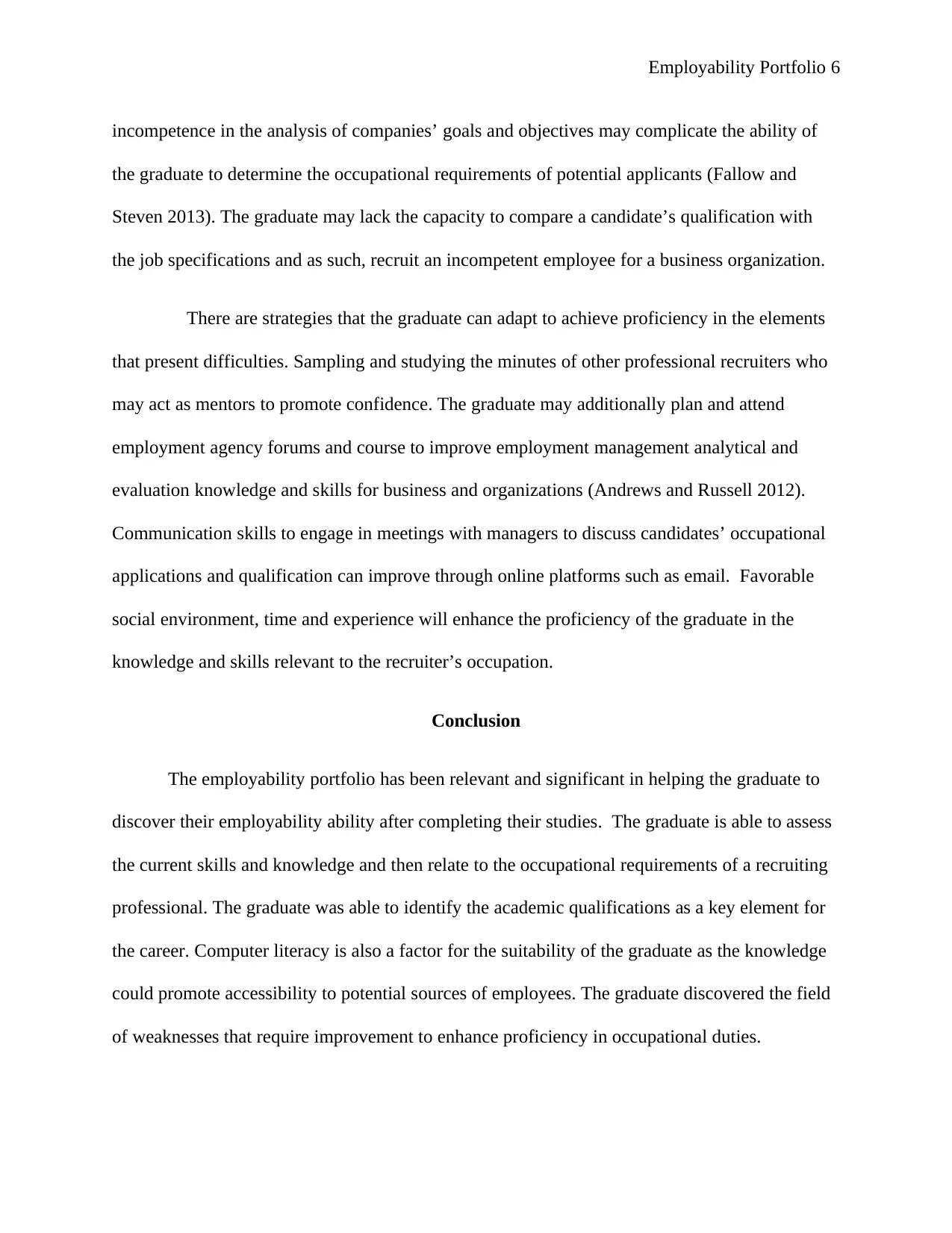
Employability Portfolio 6
incompetence in the analysis of companies’ goals and objectives may complicate the ability of
the graduate to determine the occupational requirements of potential applicants (Fallow and
Steven 2013). The graduate may lack the capacity to compare a candidate’s qualification with
the job specifications and as such, recruit an incompetent employee for a business organization.
There are strategies that the graduate can adapt to achieve proficiency in the elements
that present difficulties. Sampling and studying the minutes of other professional recruiters who
may act as mentors to promote confidence. The graduate may additionally plan and attend
employment agency forums and course to improve employment management analytical and
evaluation knowledge and skills for business and organizations (Andrews and Russell 2012).
Communication skills to engage in meetings with managers to discuss candidates’ occupational
applications and qualification can improve through online platforms such as email. Favorable
social environment, time and experience will enhance the proficiency of the graduate in the
knowledge and skills relevant to the recruiter’s occupation.
Conclusion
The employability portfolio has been relevant and significant in helping the graduate to
discover their employability ability after completing their studies. The graduate is able to assess
the current skills and knowledge and then relate to the occupational requirements of a recruiting
professional. The graduate was able to identify the academic qualifications as a key element for
the career. Computer literacy is also a factor for the suitability of the graduate as the knowledge
could promote accessibility to potential sources of employees. The graduate discovered the field
of weaknesses that require improvement to enhance proficiency in occupational duties.
incompetence in the analysis of companies’ goals and objectives may complicate the ability of
the graduate to determine the occupational requirements of potential applicants (Fallow and
Steven 2013). The graduate may lack the capacity to compare a candidate’s qualification with
the job specifications and as such, recruit an incompetent employee for a business organization.
There are strategies that the graduate can adapt to achieve proficiency in the elements
that present difficulties. Sampling and studying the minutes of other professional recruiters who
may act as mentors to promote confidence. The graduate may additionally plan and attend
employment agency forums and course to improve employment management analytical and
evaluation knowledge and skills for business and organizations (Andrews and Russell 2012).
Communication skills to engage in meetings with managers to discuss candidates’ occupational
applications and qualification can improve through online platforms such as email. Favorable
social environment, time and experience will enhance the proficiency of the graduate in the
knowledge and skills relevant to the recruiter’s occupation.
Conclusion
The employability portfolio has been relevant and significant in helping the graduate to
discover their employability ability after completing their studies. The graduate is able to assess
the current skills and knowledge and then relate to the occupational requirements of a recruiting
professional. The graduate was able to identify the academic qualifications as a key element for
the career. Computer literacy is also a factor for the suitability of the graduate as the knowledge
could promote accessibility to potential sources of employees. The graduate discovered the field
of weaknesses that require improvement to enhance proficiency in occupational duties.
⊘ This is a preview!⊘
Do you want full access?
Subscribe today to unlock all pages.

Trusted by 1+ million students worldwide
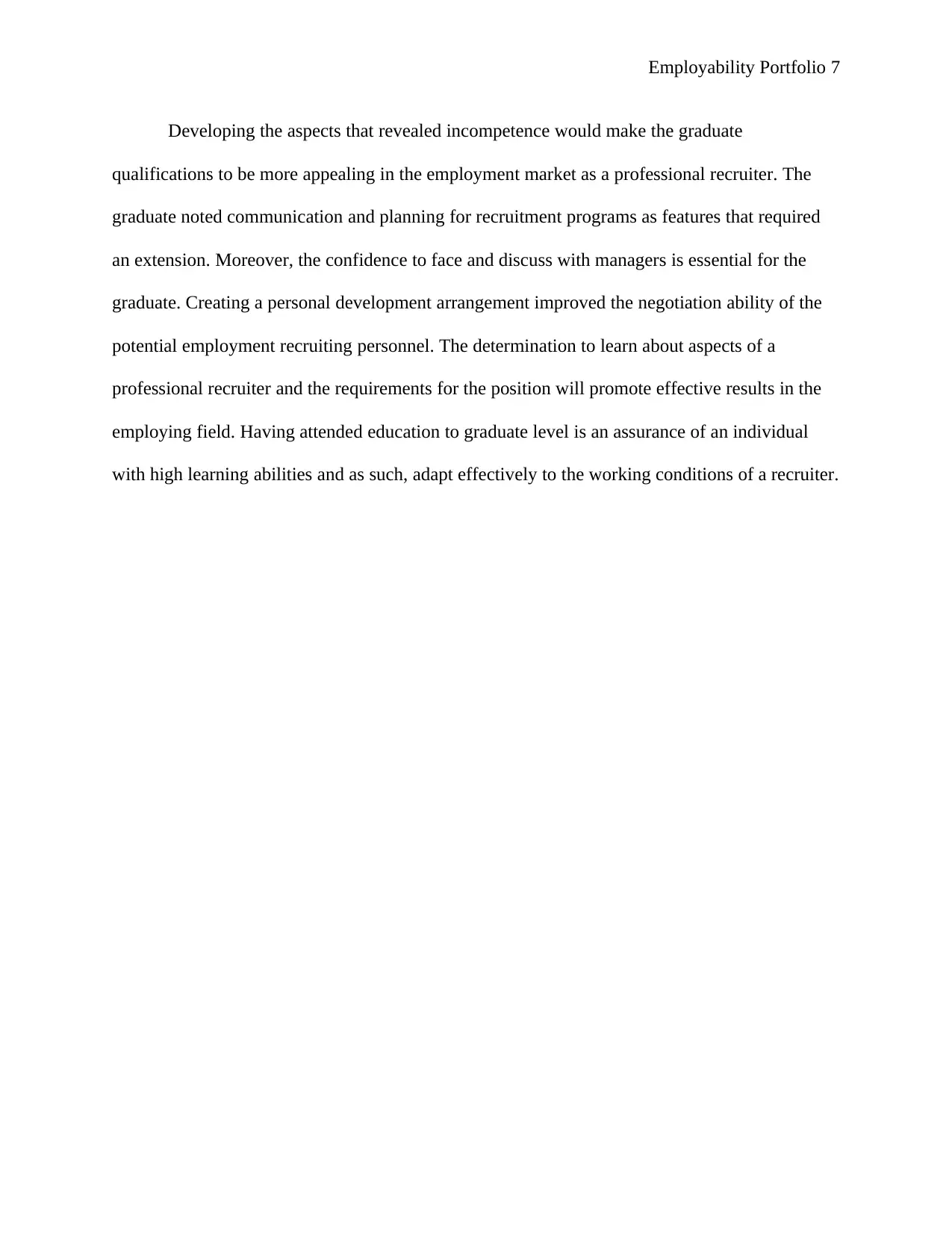
Employability Portfolio 7
Developing the aspects that revealed incompetence would make the graduate
qualifications to be more appealing in the employment market as a professional recruiter. The
graduate noted communication and planning for recruitment programs as features that required
an extension. Moreover, the confidence to face and discuss with managers is essential for the
graduate. Creating a personal development arrangement improved the negotiation ability of the
potential employment recruiting personnel. The determination to learn about aspects of a
professional recruiter and the requirements for the position will promote effective results in the
employing field. Having attended education to graduate level is an assurance of an individual
with high learning abilities and as such, adapt effectively to the working conditions of a recruiter.
Developing the aspects that revealed incompetence would make the graduate
qualifications to be more appealing in the employment market as a professional recruiter. The
graduate noted communication and planning for recruitment programs as features that required
an extension. Moreover, the confidence to face and discuss with managers is essential for the
graduate. Creating a personal development arrangement improved the negotiation ability of the
potential employment recruiting personnel. The determination to learn about aspects of a
professional recruiter and the requirements for the position will promote effective results in the
employing field. Having attended education to graduate level is an assurance of an individual
with high learning abilities and as such, adapt effectively to the working conditions of a recruiter.
Paraphrase This Document
Need a fresh take? Get an instant paraphrase of this document with our AI Paraphraser
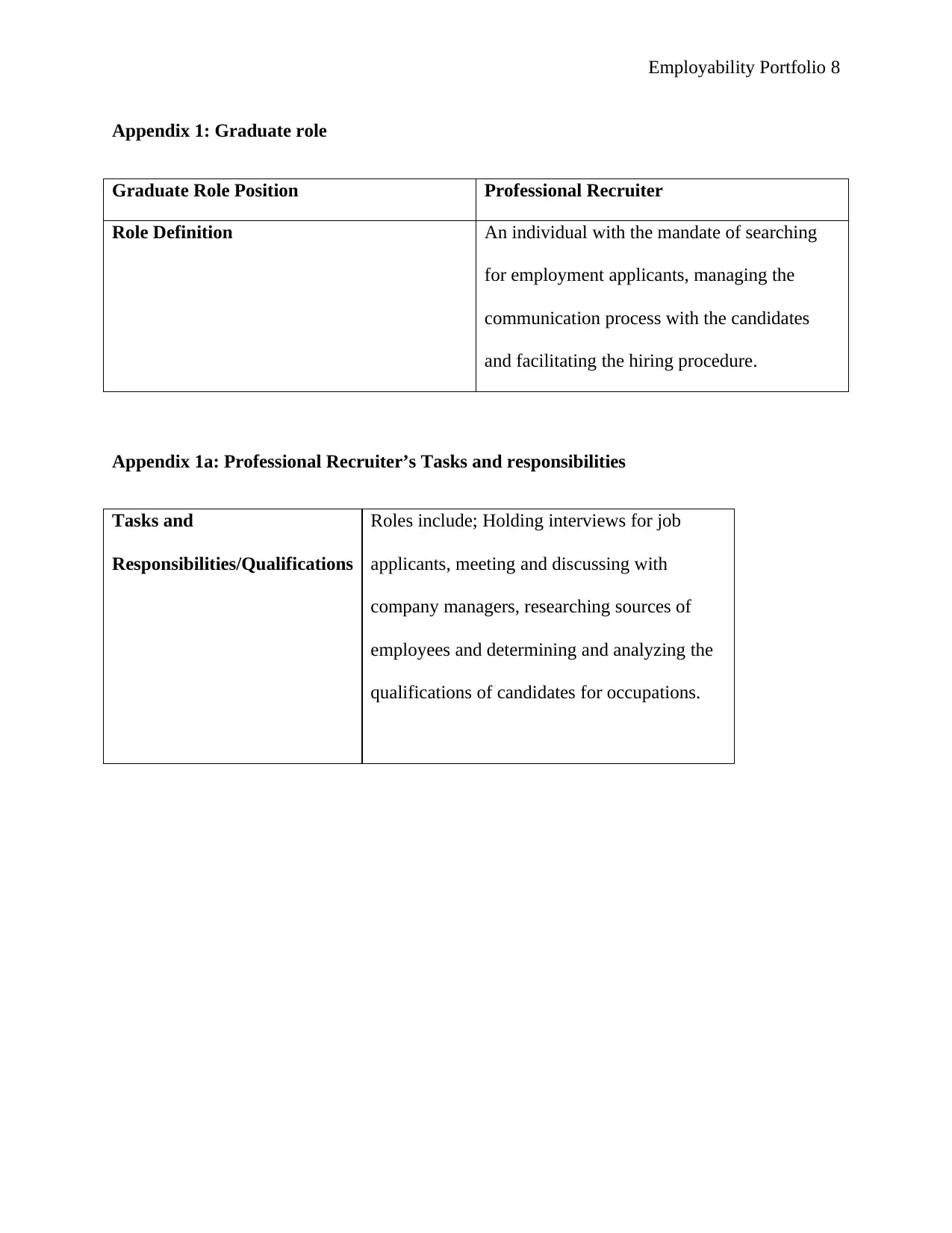
Employability Portfolio 8
Appendix 1: Graduate role
Graduate Role Position Professional Recruiter
Role Definition An individual with the mandate of searching
for employment applicants, managing the
communication process with the candidates
and facilitating the hiring procedure.
Appendix 1a: Professional Recruiter’s Tasks and responsibilities
Tasks and
Responsibilities/Qualifications
Roles include; Holding interviews for job
applicants, meeting and discussing with
company managers, researching sources of
employees and determining and analyzing the
qualifications of candidates for occupations.
Appendix 1: Graduate role
Graduate Role Position Professional Recruiter
Role Definition An individual with the mandate of searching
for employment applicants, managing the
communication process with the candidates
and facilitating the hiring procedure.
Appendix 1a: Professional Recruiter’s Tasks and responsibilities
Tasks and
Responsibilities/Qualifications
Roles include; Holding interviews for job
applicants, meeting and discussing with
company managers, researching sources of
employees and determining and analyzing the
qualifications of candidates for occupations.
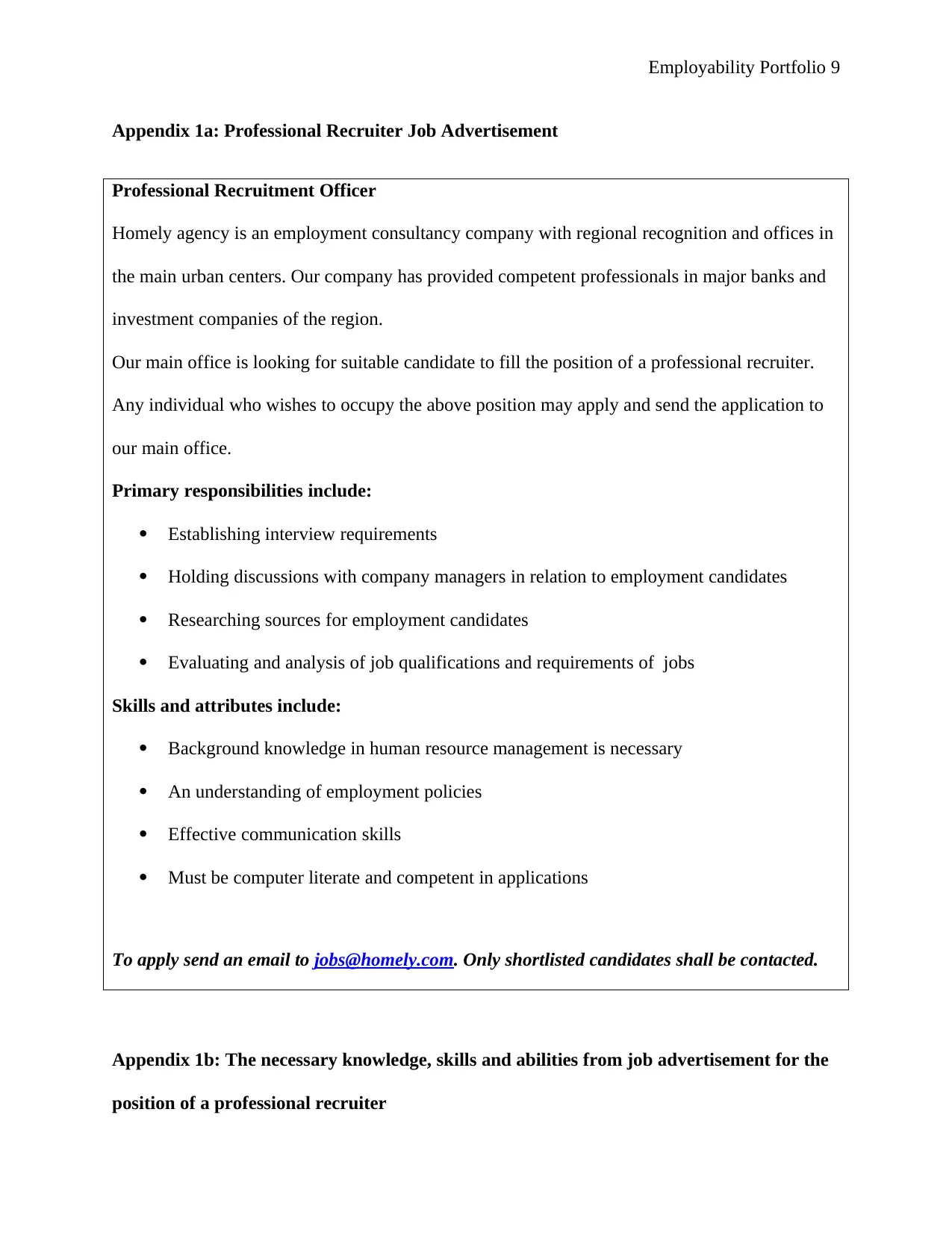
Employability Portfolio 9
Appendix 1a: Professional Recruiter Job Advertisement
Professional Recruitment Officer
Homely agency is an employment consultancy company with regional recognition and offices in
the main urban centers. Our company has provided competent professionals in major banks and
investment companies of the region.
Our main office is looking for suitable candidate to fill the position of a professional recruiter.
Any individual who wishes to occupy the above position may apply and send the application to
our main office.
Primary responsibilities include:
Establishing interview requirements
Holding discussions with company managers in relation to employment candidates
Researching sources for employment candidates
Evaluating and analysis of job qualifications and requirements of jobs
Skills and attributes include:
Background knowledge in human resource management is necessary
An understanding of employment policies
Effective communication skills
Must be computer literate and competent in applications
To apply send an email to jobs@homely.com. Only shortlisted candidates shall be contacted.
Appendix 1b: The necessary knowledge, skills and abilities from job advertisement for the
position of a professional recruiter
Appendix 1a: Professional Recruiter Job Advertisement
Professional Recruitment Officer
Homely agency is an employment consultancy company with regional recognition and offices in
the main urban centers. Our company has provided competent professionals in major banks and
investment companies of the region.
Our main office is looking for suitable candidate to fill the position of a professional recruiter.
Any individual who wishes to occupy the above position may apply and send the application to
our main office.
Primary responsibilities include:
Establishing interview requirements
Holding discussions with company managers in relation to employment candidates
Researching sources for employment candidates
Evaluating and analysis of job qualifications and requirements of jobs
Skills and attributes include:
Background knowledge in human resource management is necessary
An understanding of employment policies
Effective communication skills
Must be computer literate and competent in applications
To apply send an email to jobs@homely.com. Only shortlisted candidates shall be contacted.
Appendix 1b: The necessary knowledge, skills and abilities from job advertisement for the
position of a professional recruiter
⊘ This is a preview!⊘
Do you want full access?
Subscribe today to unlock all pages.

Trusted by 1+ million students worldwide
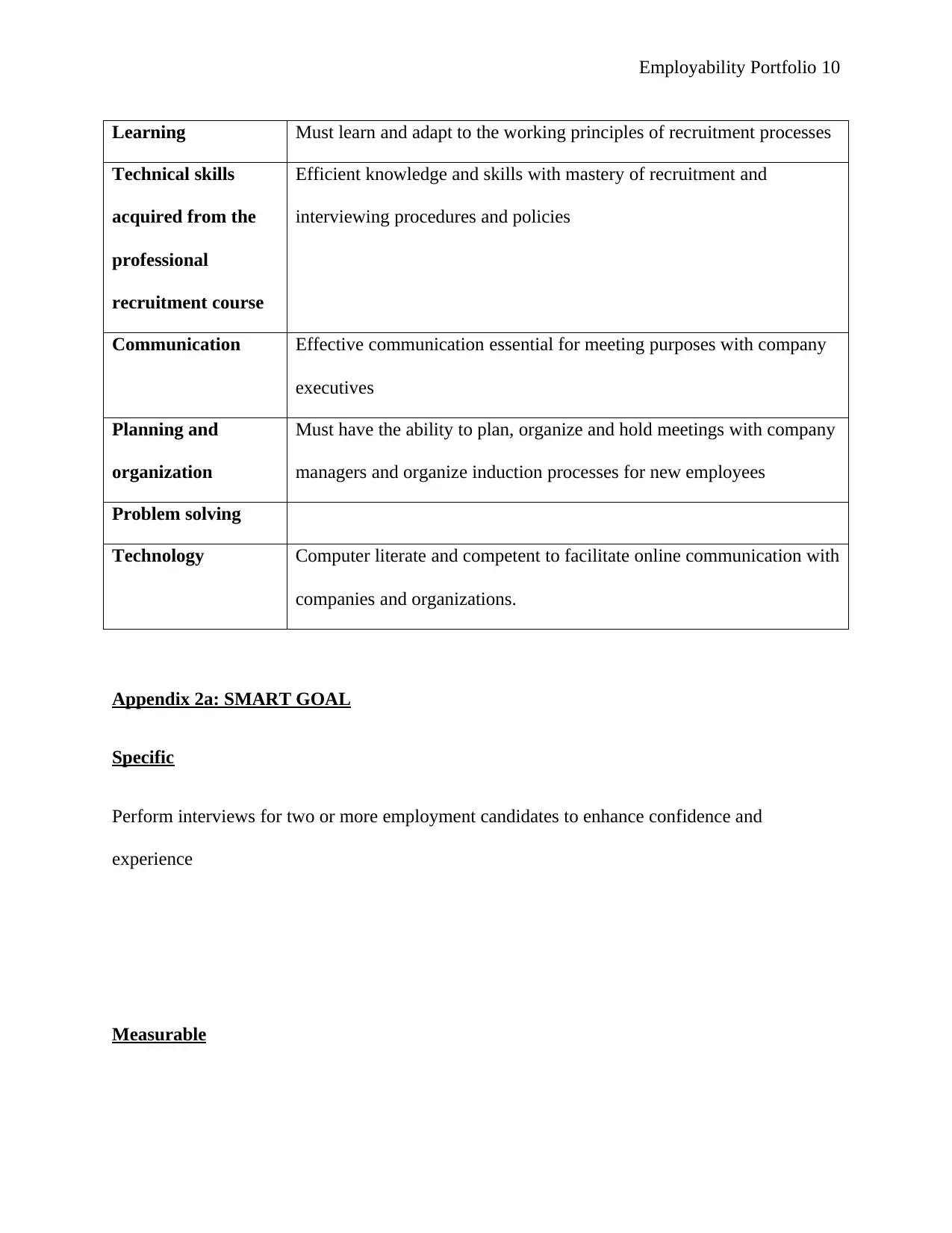
Employability Portfolio 10
Learning Must learn and adapt to the working principles of recruitment processes
Technical skills
acquired from the
professional
recruitment course
Efficient knowledge and skills with mastery of recruitment and
interviewing procedures and policies
Communication Effective communication essential for meeting purposes with company
executives
Planning and
organization
Must have the ability to plan, organize and hold meetings with company
managers and organize induction processes for new employees
Problem solving
Technology Computer literate and competent to facilitate online communication with
companies and organizations.
Appendix 2a: SMART GOAL
Specific
Perform interviews for two or more employment candidates to enhance confidence and
experience
Measurable
Learning Must learn and adapt to the working principles of recruitment processes
Technical skills
acquired from the
professional
recruitment course
Efficient knowledge and skills with mastery of recruitment and
interviewing procedures and policies
Communication Effective communication essential for meeting purposes with company
executives
Planning and
organization
Must have the ability to plan, organize and hold meetings with company
managers and organize induction processes for new employees
Problem solving
Technology Computer literate and competent to facilitate online communication with
companies and organizations.
Appendix 2a: SMART GOAL
Specific
Perform interviews for two or more employment candidates to enhance confidence and
experience
Measurable
Paraphrase This Document
Need a fresh take? Get an instant paraphrase of this document with our AI Paraphraser
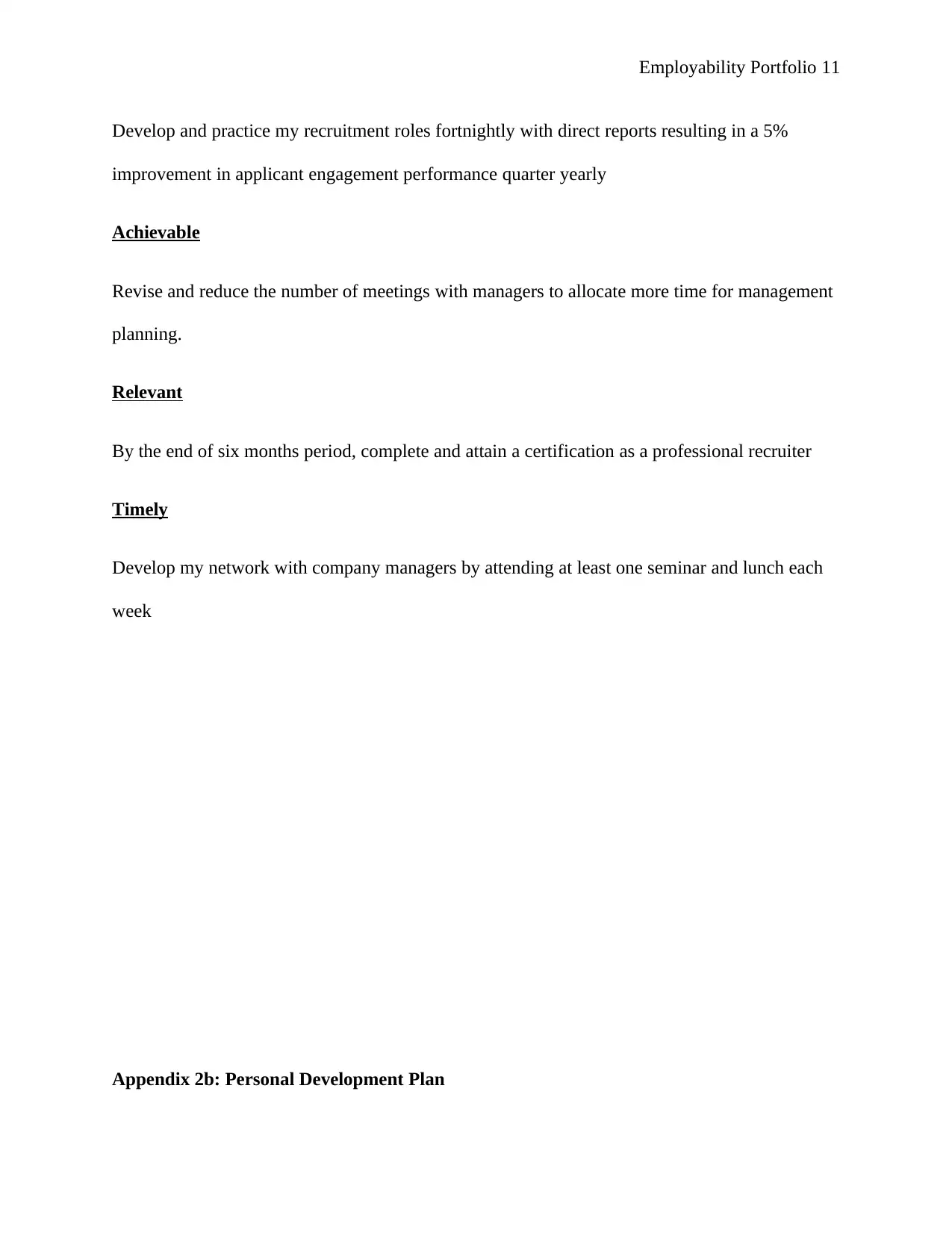
Employability Portfolio 11
Develop and practice my recruitment roles fortnightly with direct reports resulting in a 5%
improvement in applicant engagement performance quarter yearly
Achievable
Revise and reduce the number of meetings with managers to allocate more time for management
planning.
Relevant
By the end of six months period, complete and attain a certification as a professional recruiter
Timely
Develop my network with company managers by attending at least one seminar and lunch each
week
Appendix 2b: Personal Development Plan
Develop and practice my recruitment roles fortnightly with direct reports resulting in a 5%
improvement in applicant engagement performance quarter yearly
Achievable
Revise and reduce the number of meetings with managers to allocate more time for management
planning.
Relevant
By the end of six months period, complete and attain a certification as a professional recruiter
Timely
Develop my network with company managers by attending at least one seminar and lunch each
week
Appendix 2b: Personal Development Plan
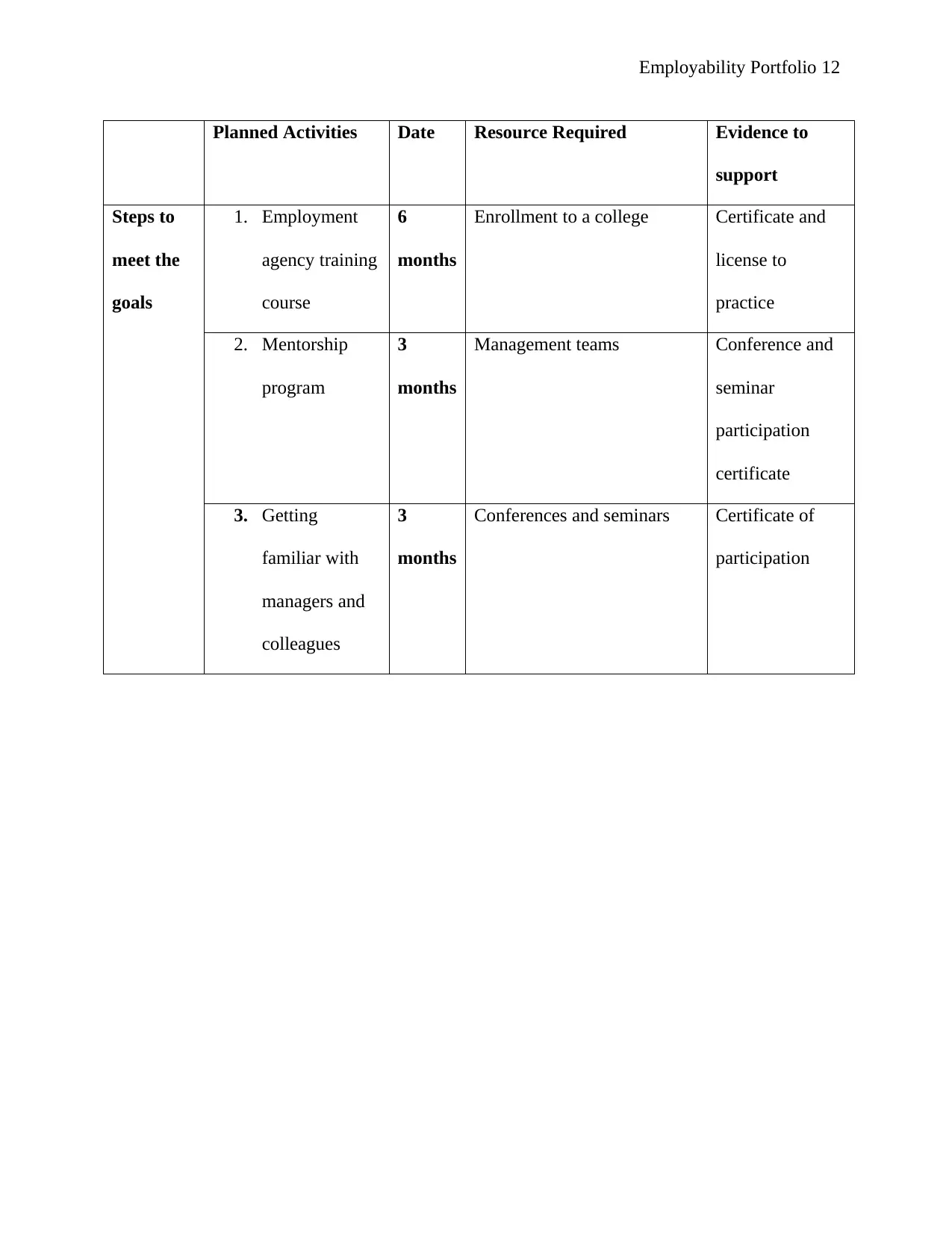
Employability Portfolio 12
Planned Activities Date Resource Required Evidence to
support
Steps to
meet the
goals
1. Employment
agency training
course
6
months
Enrollment to a college Certificate and
license to
practice
2. Mentorship
program
3
months
Management teams Conference and
seminar
participation
certificate
3. Getting
familiar with
managers and
colleagues
3
months
Conferences and seminars Certificate of
participation
Planned Activities Date Resource Required Evidence to
support
Steps to
meet the
goals
1. Employment
agency training
course
6
months
Enrollment to a college Certificate and
license to
practice
2. Mentorship
program
3
months
Management teams Conference and
seminar
participation
certificate
3. Getting
familiar with
managers and
colleagues
3
months
Conferences and seminars Certificate of
participation
⊘ This is a preview!⊘
Do you want full access?
Subscribe today to unlock all pages.

Trusted by 1+ million students worldwide
1 out of 14
Related Documents
Your All-in-One AI-Powered Toolkit for Academic Success.
+13062052269
info@desklib.com
Available 24*7 on WhatsApp / Email
![[object Object]](/_next/static/media/star-bottom.7253800d.svg)
Unlock your academic potential
Copyright © 2020–2025 A2Z Services. All Rights Reserved. Developed and managed by ZUCOL.





